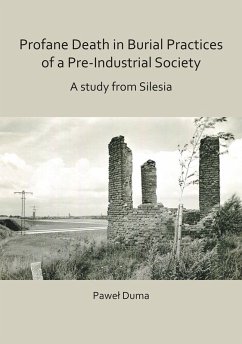'Profane Death in Burial Practices of a Pre-Industrial Society: A study from Silesia' discusses phenomena characteristic of the funeral practices of the pre-industrial society of Silesia (Poland). The author explores specific groups of people: unbaptised children, women who died in childbirth, suicides, convicts and those who perished in epidemics, who were refused an honorary burial in consecrated land or had ceremonies conducted on special terms. Also discussed are the places where the bodies of these excluded individuals were interred. The study is supplemented by an analysis of the results of archaeological research, which mainly involved fieldwork carried out at former execution sites. The skeletal remains of numerous convicts were discovered during these investigations, together with the remnants of stonebuilt gallows. This analysis is especially relevant for interpreting selected funeral finds, socalled 'vampire burials', and the general question of atypical treatment of bodies perceived as unworthy, badly-deceased or 'unclean'. The research subject is novel, as no similar synthetic studies on unusual funerary practices have yet been conducted in Polish archaeology for this particular era and territory. The author is primarily concerned with cases mentioned in historical and archaeological sources from the region of Silesia, but evidence from beyond this area is also presented. Chronologically the study covers the period between the 15th and early 19th centuries.
Dieser Download kann aus rechtlichen Gründen nur mit Rechnungsadresse in A, B, BG, CY, CZ, D, DK, EW, E, FIN, F, GR, HR, H, IRL, I, LT, L, LR, M, NL, PL, P, R, S, SLO, SK ausgeliefert werden.









